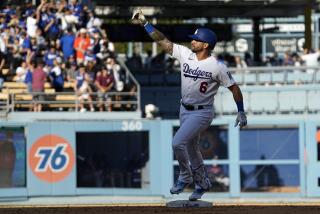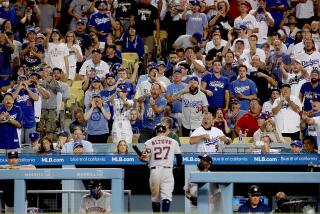Astros’ Prosperity Helping City to Forget Problems
- Share via
HOUSTON — A restaurant near the Astrodome in Houston displayed a banner atop its roof that read: “We are Astro Proud.”
Down the road a bit, another sign was affixed to an abandoned storefront. It read: “We’ve Moved.”
Just as the city of Houston and its oil-based economy slipped into a recession, the Astros baseball team found prosperity.
“This should be every player’s dream, to be on a team like this--a team that was expected to win in recent years but didn’t, and a team that wasn’t expected to win this year and did,” Astros catcher Alan Ashby said.
The Astros’ dream came true Thursday when Mike Scott pitched a no-hitter against San Francisco to clinch the West Division and send Houston to a best-of-seven series against the New York Mets.
But while the Astros’ success has been a welcome diversion to the city’s problems, the players themselves were none too sure of their future only months ago.
Coming off a disappointing 83-79 season and third-place finish in the National League West, the Astros last winter hired St. Louis Cardinals’ coach Hal Lanier to replace Bob Lillis as manager. And with him, Lanier brought a new, more aggressive philosophy that the organization hoped would show instant results.
While reorganizing under Lanier’s program, the Astros compiled a 10-18 spring-training record. Despite some successful work on fundamentals that Lanier considered more important than wins and losses, there was concern--not just among fans, but also among players.
“When we came out of spring training we were puzzled and a little down on ourselves,” Ashby said. “We’d had a poor spring, and we hadn’t yet proved to ourselves that we were at all capable of winning. We went into the season and lost our first two, and all of a sudden, we were written off.
“Then, we started to win,” Ashby said.
The Astros went on a 7-1 trip and ended the month of April with a 14-6 mark, jumping off to an early lead in the West. They lost the lead briefly to the San Francisco Giants, then took over for good on July 21 with their fourth straight victory, three coming against the NL East champion Mets.
“I think it’s fair to say the players and fans didn’t know what to expect this year,” Lanier said. “But I had a pretty good idea of what I wanted to do.
“I didn’t worry about the spring training record. It didn’t mean anything. And two games do not make a season. The papers were all saying, ‘Here we go again. It’s going to be a long summer.’ But I had a very positive attitude.
“It was a learning period for me and some of the coaches, like Yogi Berra and Gene Tenace. All we had were scouting reports, but I wanted to see this club with my own eyes.”
What Lanier could remember seeing of Houston in past seasons was uninspiring.
“I only know what I saw as a coach and what I was told, but it wasn’t too good,” Lanier said. “Last year, if this club had gone 0-2 then had a little trouble on the road, there would have been a problem. They might have started saying, ‘Uh oh.’ But I don’t think that would ever happen with this club.
“You start saying, ‘Here we go again,’ and pretty soon those two-game losing streaks turn into six games. I think that’s one of the differences between this year’s club and last year’s.”
Another obvious difference has been the emergence of players such as first baseman Glenn Davis, outfielder Kevin Bass and pitcher Mike Scott. Davis has been near the league lead in homers all season and was sure to top the 100-RBI mark. Hitting well over .300, Bass leads the club in hits and is second only to Billy Doran in runs. Scott is the NL leader in strikeouts and the club leader in victories.
For so many years, the Astros were a club tailored to the vastness of the Astrodome, stressing speed, defense and pitching--but no power. Still stressing speed--both offensively and defensively--under Lanier, a key to this club’s turnaround has been the power of Davis.
“You can talk about all the other MVP’s in this league, but Glenn Davis has meant as much to this club as any player has to any other club,” Doran said. “He’s given us the power we’ve never had before.”
Doran, a second baseman, says he doubts the club’s previous lack of power was through neglect, although it sometimes appeared that way.
“We were playing the cards handed to us,” said Doran, a fourth-year player who came up through the Astros’ farm system. “There was no one in the minor leagues who was capable of doing what Glenn does. As soon as Glenn came around, they brought him up. I’m sure they would have liked to have someone like him a lot sooner, but I know I didn’t play with anyone like him in the minors.”
While Davis, Bass and Scott have received the most national attention, some of the Astros’ players and coaches believe Doran may be the club’s MVP. Astros Coach Denis Menke thinks Doran has Hall of Fame qualities.
“He has one of the best gloves at second base I’ve seen,” Menke said. “He makes the double play as well as anyone. He reminds me of Bill Mazeroski.”
Moving the fences in at the Astrodome may also have changed the team’s offense slightly, Doran says, placing more of a premium on power.
“I suppose it means more home runs, but you also get a few more doubles and a few less triples,” Doran said. “It’s probably also helped the batting averages because the way it was before, a guy could go back to the 390-foot sign and catch fly balls. Now, they’re off the wall.”
The major problem with the Astrodome is the playing surface. A $42 million Astrodome complex renovation, including installation of Diamond Vision and new seats, was finished this year, but the turf has been on the field since 1978. It’s faded, badly worn, full of bumpy seams and it looks like someone changed the oil in their car in right field. Some of the players were hoping fans would tear it up after the clinching--as the New York Mets fans did at Shea Stadium--so Harris County would have to install a new carpet.
The toughest influence this season to gauge, however, has been that of Lanier. There are no statistics for managers, no scouting reports.
“How can you tell?” Doran said. “All you know is the guy takes a team picked to finish fifth by the so-called experts, and look where we are now.”
While calling Lanier “a tough, aggressive manager,” Ashby also admits that his contribution is “a hard thing to assess.” One thing about Lanier, though, is that he “doesn’t permit excuses or lack of hustle.”
Lanier says one of the first things he noticed about the club was that Lillis had not made very good use of the talent available, especially the speed on the team.
“In the first meeting I had with the players this spring, I told them that I was not what they were used to,” Lanier said. “I was not laid back. I was not quiet. If they did something wrong, they were going to hear about it. If they did something right, they’d hear about it, too.
“You might see a water cooler flying around the dugout. That’s just me. But I’m also a positive person, and I think that rubs off. I wanted to let them play the brand of baseball they were capable of playing, and I think the players welcomed going from a club that didn’t try to make anything happen to a club that played aggressively.”
It would be hard to fault a player if he were just a little intimidated by Lanier, but Doran says they are not. “I don’t think anyone’s afraid to talk to him,” Doran said. And while communication is important to Lanier, he says it has to be done properly.
Lanier’s style has been compared to St. Louis Manager Whitey Herzog’s. And though Lanier acknowledges the similarity, he says another former manager also had a great influence on him.
“I played the last few years of my major league career with the New York Yankees, and there were a lot of different personalities on that club,” Lanier said. “Ralph Houk finished his last two years there as manager the same time I did (1972 and ‘73). He knew I wanted to stay in baseball, and he always told me that the guys you really have to keep happy and have good communication with were the guys that weren’t playing regularly. I was one of those guys, and he used to come by and ask me what I thought about certain things.
“With the regulars, all you really need to do is give them a pat on the back or a kick in the butt. Anyway, I can’t see anyone not enjoying themselves this year, when we’re winning.”
More to Read
Go beyond the scoreboard
Get the latest on L.A.'s teams in the daily Sports Report newsletter.
You may occasionally receive promotional content from the Los Angeles Times.










